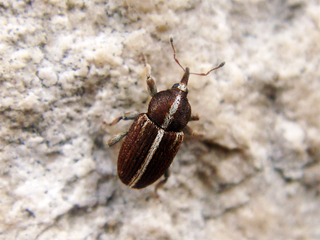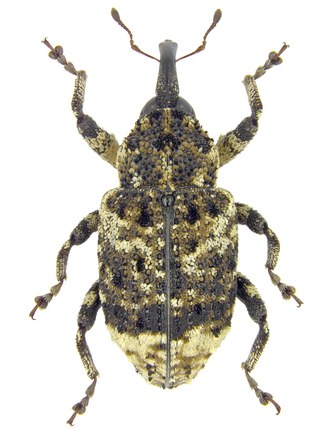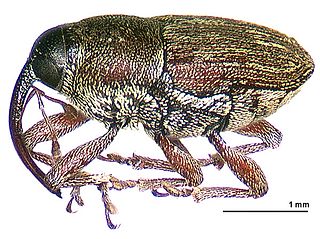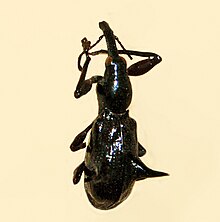
The Curculionidae are a family of weevils, commonly called snout beetles or true weevils. They are one of the largest animal families with 6,800 genera and 83,000 species described worldwide. They are the sister group to the family Brentidae.

Weevils are beetles belonging to the superfamily Curculionoidea, known for their elongated snouts. They are usually small – less than 6 mm in length – and herbivorous. Approximately 97,000 species of weevils are known. They belong to several families, with most of them in the family Curculionidae. It also includes bark beetles, which while morphologically dissimilar to other weevils in lacking the distinctive snout, is a subfamily of Curculionidae. Some other beetles, although not closely related, bear the name "weevil", such as the biscuit weevil, which belongs to the family Ptinidae.

The beetle subfamily Curculioninae is part of the weevil family Curculionidae. It contains over 23,500 described species in 2,200 genera, and is therefore the largest weevil subfamily. Given that the beetle order (Coleoptera) contains about one-quarter of all known organisms, the Curculioninae represent one of the – if not the – most successful radiations of terrestrial Metazoa.

Brentidae, sometimes known as the primitive weevils, is a cosmopolitan family of primarily xylophagous beetles also known as straight-snouted weevils. The concept of this family has been expanded with the inclusion of three groups formerly placed in the Curculionidae; the subfamilies Apioninae, Cyladinae, and Nanophyinae, as well as the Ithycerinae, previously considered a separate family. They are most diverse in the tropics, but occur throughout the temperate regions of the world. They are among the families of weevils that have non-elbowed antennae, and tend to be elongate and flattened, though there are numerous exceptions.

Eupterotidae is a family of insects in the order Lepidoptera with more than 300 described species.

The Megalopodidae are a small family of leaf beetles, previously included as a subfamily within the Chrysomelidae. One of its constituent subfamilies, Zeugophorinae, has also frequently been treated as a subfamily within Chrysomelidae. The family contains approximately 30 genera worldwide, primarily in the nominate subfamily Megalopodinae, and mostly circumtropical.

Cryptorhynchinae is a large subfamily of weevils (Curculionidae), with some 6000 species. They are found in most zoogeographic regions although they are most diverse in the Neotropics, Australia and Oceania.

Nemonychidae is a small family of weevils, placed within the primitive weevil group because they have straight rather than geniculate (elbowed) antennae. They are often called pine flower weevils. As in the Anthribidae, the labrum appears as a separate segment to the clypeus, and the maxillary palps are long and projecting. Nemonychidae have all ventrites free, while Anthribidae have ventrites 1-4 connate or partially fused. Nemonychidae lack lateral carinae on the pronotum, while these are usually present, though may be short, in Anthribidae.

Palophaginae is a small beetle subfamily within the family Megalopodidae. It contains two tribes, with five species in four genera:

Rhyzobius ventralis, common names including black lady beetle, gumtree scale ladybird, is a ladybird species endemic to Tasmania and all the mainland states of Australia except the Northern Territory. It is also found in New Zealand, but not naturally. The earliest New Zealand record is Auckland, 1898

Hadramphus, commonly known as knobbled weevils, is a genus of flightless molytine weevils from the family Curculionidae. It is endemic to New Zealand and consists of four species.

Cyclominae is a subfamily of weevils.

Cossoninae is a true weevil subfamily in the family Curculionidae.

Ottistirini is a weevil tribe in the subfamily Entiminae.

Anthribinae is a subfamily of fungus weevils in the family of beetles known as Anthribidae. There are over 50 genera and more than 80 described species in Anthribinae.
Lissorhoptrus is a genus of rice water weevils in the family of beetles known as Erirhinidae. There are at least 20 described species in Lissorhoptrus.

Linogeraeus is a genus of flower weevils in the family of beetles known as Curculionidae. There are at least 60 described species in Linogeraeus.

Mesoptiliinae is a subfamily of true weevils in the family Curculionidae. There are at about 23 genera and 40 described species in Mesoptiliinae.

Beverley Anne Holloway was a New Zealand entomologist. Holloway was a preeminent lucanid systematist and was awarded the New Zealand Commemoration Medal in 1990 for services to New Zealand as a scientist. She was also elected a Fellow of the Entomological Society of New Zealand.

Mesophyletidae is an extinct family of weevils known from a number of genera preserved in Cretaceous amber. The family was first described as a subfamily in the extant family Caridae, and subsequently raised to family status in 2018.



















